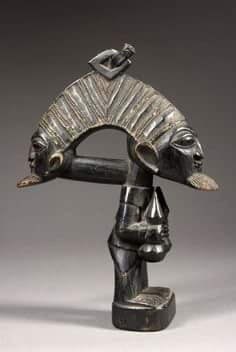Yoruba Cosmology - Èṣù - Ẹlẹ́gba and the chameleon
 In Yorùbá cosmology, there is a belief that the world is a complex of opposing forces. For example the Yorùbá perception of the eclipse as a conflict between the sun and moon is a widespread belief. There is a belief of opposition or complementarity of sun and moon, day and night, hot and cold, wet and dry, visible and invisible, all complementing one another.
In Yorùbá cosmology, there is a belief that the world is a complex of opposing forces. For example the Yorùbá perception of the eclipse as a conflict between the sun and moon is a widespread belief. There is a belief of opposition or complementarity of sun and moon, day and night, hot and cold, wet and dry, visible and invisible, all complementing one another.
Hence there’s this popular saying: tibi tire la dá ilé ayé (world is sustained by good and evil). Also that “Inú ìkòkò dúdú l'ẹ̀kọ funfun ti ńjáde” (it is out of a black pot that the white porridge comes out). In other words, you use a black pot to cook and make white porridge.
The implication here apart from signifying that good things can come out of a bad event and vice versa, it also relates night to daylight because daylight comes out of the night. For this reason, Yorùbá cosmology has forces associated with those on the right and those on the left.
Those of the left are associated with evil, and those of the right with good. As a result of this, there’s a belief that there are certain deities created by Olódùmarè to reconcile these forces that are in perpetual opposition to one another - a part of dualism.
The Yorùbá Irùnmọlẹ̀ associated with this balancing act is “Èṣù-Ẹlẹ́gba”, the divine messenger, who is associated with the crossroads. Èṣù is not the aggregate of evil. He is the messenger of other Òrìṣà and Irùnmọlẹ̀, bringing both good and evil tidings. His embodiment of complementarity not only assumes the possibility of balance in the world but also implies unpredictability as humans are left guessing the fate Èṣù has in store for them.
This ambiguity has crowned Èṣù as a master trickster. He has been described as a chameleon, one that camouflages - a shadowy creature, now visible, now invisible!
Èṣú’s oríkì goes like:
Bara ti o logun ika, to sọ ile ana rẹ di ahoro
Bara l’abẹlẹkun sunkun ki ẹru o ba ẹlẹkun
Bi ẹlẹkun ba n sọkun, Laaroye a ma sun ẹjẹ
Bara ni abonimi su mi ki ẹru ba onimi
B’onimi ba n su imi, Laaroye a ma su ifun
Bara who does not have evil medicine but turns his in-laws home into desolation
Bara is the one who weeps with those weeping and they will be frightened
By the time they see Èṣú Laaroye weeping blood
The one defecating will be full of fright by the time he sees Èṣú defecating his intestines
This is our beloved Èṣú in Yorubaland as exemplified in the above oríkì. The Irùnmọlẹ̀ that goes the extra mile in a frightening way when angered! A master unpredictable prankster indeed.
The elusive and unpredictable chameleon-like power of Èṣù is best illustrated in his ability to make pronouncements - a curse or a blessing. That is, to speak Àṣẹ - the power of the word and therefor to create into being the vital force of efficacy, the evocative power to bring something into effect.
Àṣẹ is generally understood to mean the force or power that the Supreme Being, Olodumare used to create the universe. It is believed that Olodumare handed this power over to Èṣù, who uses it to effect the balance between good and evil forces in the world and to make the final decision on human fate.
Èṣù is the keeper of Àṣẹ, and in the words of William Bascom in his book - Sixteen Cowries, Èṣù is “the divine enforcer” of fate. In Yorùbá cosmology, there is a ritual awareness of the ubiquity of Èṣù in the everyday language.
Orí (inner head/fate) is frequently used in both serious and trivial moments and there is a mental or psychical understanding in Yoruba belief system that implies acknowledgement of the role of fate in one’s dealing with other humans.
Fate implies favour and retribution, favour for the supplicant and retribution for the supplicant’s adversary. Our act of appealing to our Orí (fate) in conversation always assumes the expectation of a response either symbolic or actual.
Another oríkì of Èṣú (from the Internet)...
Èṣù
Èṣù Ọdara,
Èṣù laalu ogirioko.
Ọkunrin orita,
A jo langa langa lalu
A rin lanja lanja lalu.
O de ibi ija de mole.
Ija ni otaru ba d'ele ife
To fi de omo won.
Oro Èṣù to to to akoni.
A o fi ida rẹ lale.
Èṣù ma ṣe mi o.
Ọmọ ẹlomiran ni ko lo ṣe
Pa ado asubi da.
Nọ ado asure si wa.
Aṣẹ.
Translation...
Divine Messenger,
Divine Messenger of Transformation,
Divine Messenger speak with power.
Man of the crossroads
Dance to the drum.
Tickle the toe of the drum.
Move beyond strife.
Strife is contrary to the spirit of Heaven.
Unite the unsteady feet of weaning children.
The word of the Divine Messenger is always respected.
We shall use your sword to touch the Earth.
Divine Messenger do not confuse me.
Let someone else be confused.
Turn my suffering around.
Give me the blessing of the calabash.
So be it.
References:
Osagie I: African Modernity and the Philosophy of Culture in the Works of Femi Euba
Euba F: Archetypes, Imprecators, and Victims of Fate: Origins and Developments of Satire in Black Drama
LawaL B: “A Big Calabash with Two Halves: The Yoruba Vision of the Cosmos.” - A lecture delivered at Stellar Connections: Explorations in Cultural Astronomy symposium. ~ Olobe Oloyo